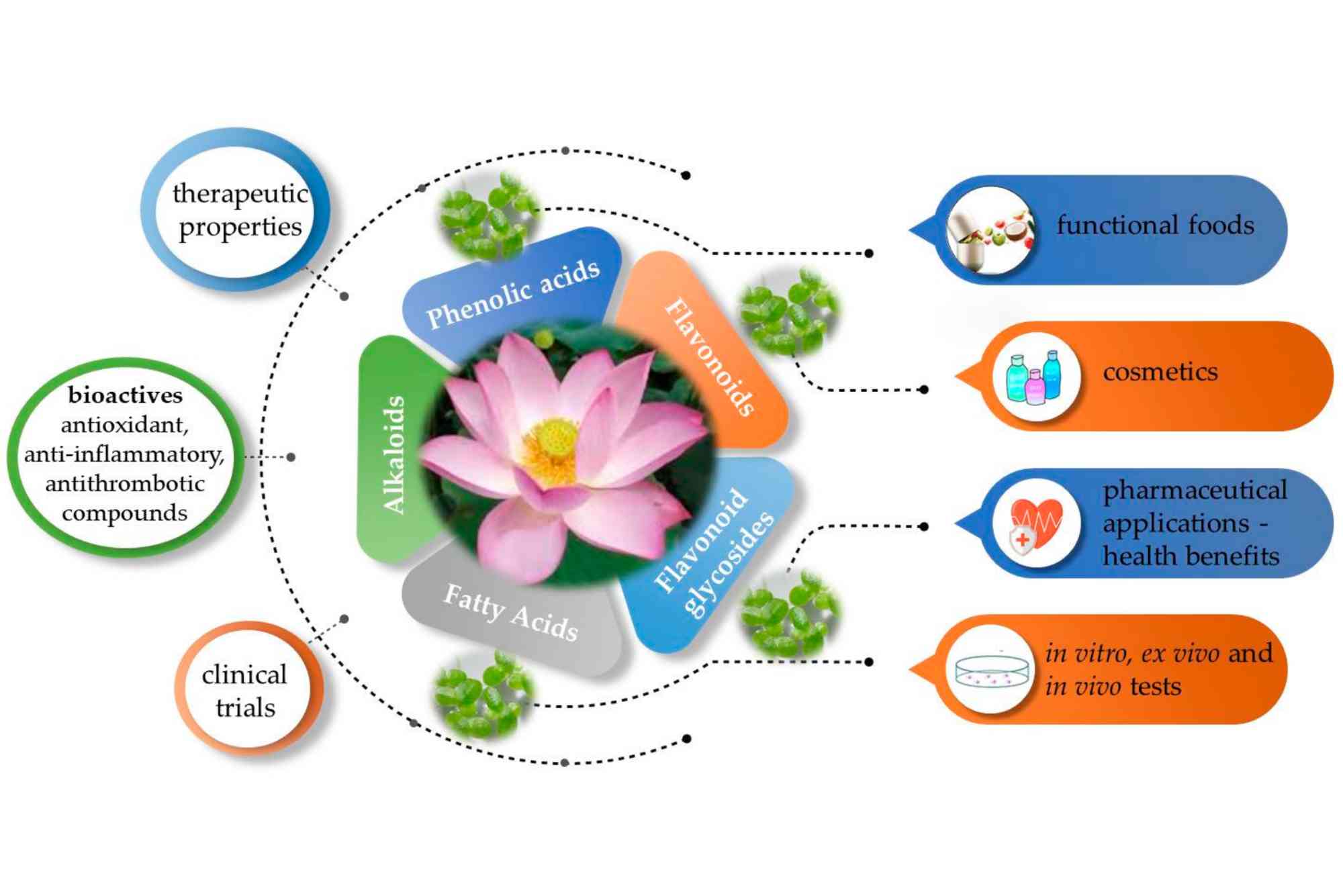Lotus Leaf Health Benefits Backed by Science
The lotus leaf, a staple in traditional medicine across Asia, has gained modern recognition for its wide-ranging health benefits. From promoting weight loss to supporting cardiovascular function, the scientific community is increasingly interested in how lotus leaves can contribute to wellness. The keyword lotus leaf health benefits is not just trending in holistic health circles but also drawing attention in academic and clinical research. In this article, we’ll dive deep into the proven advantages of this remarkable plant and how you can safely incorporate it into your health routine.
The Nutritional Power of the Lotus Leaf
Lotus leaves, derived from the Nelumbo nucifera plant, contain a rich variety of bioactive compounds. These include alkaloids, flavonoids, polyphenols, and tannins. These nutrients are known for their antioxidant, anti-inflammatory, and lipid-lowering effects. Unlike lotus seeds or roots, the leaf offers a unique chemical profile that makes it particularly effective for addressing modern health concerns like obesity, high cholesterol, and metabolic syndrome. Because of these properties, researchers have been examining lotus leaves for their therapeutic potential in both traditional and modern medical settings.
Weight Loss and Metabolism Support
One of the most well-documented lotus leaf health benefits is its ability to assist in weight loss. A 2010 study published in Nutrition & Metabolism showed that lotus leaf extract helped prevent the absorption of fats and carbohydrates, reducing overall body fat. The alkaloids and flavonoids present in lotus leaves appear to inhibit pancreatic lipase, an enzyme responsible for breaking down dietary fat. This leads to lower fat absorption and increased fat excretion through the digestive tract. Additionally, the polyphenols in lotus leaves have been shown to increase thermogenesis, which boosts metabolism and helps the body burn more calories. These effects make lotus leaf a useful supplement in any weight management program, especially when combined with exercise and a healthy diet.
Cholesterol and Cardiovascular Health
Maintaining a healthy heart is crucial, and the lotus leaf health benefits extend into cardiovascular support. Studies have shown that lotus leaf extract can significantly lower LDL (bad) cholesterol while raising HDL (good) cholesterol. This is primarily due to the presence of quercetin and other polyphenolic compounds. These antioxidants help reduce oxidative stress, which is a major factor in the development of atherosclerosis. A 2013 study in Phytomedicine revealed that rats given lotus leaf extract experienced lower blood lipid levels and improved vascular function. This indicates that regular intake of lotus leaf, under supervision, can be a natural way to support heart health and reduce the risk of coronary artery disease.
Blood Sugar Regulation and Diabetes Support
Diabetes is a growing global health concern, and natural interventions like lotus leaf can play a supportive role. The anti-hyperglycemic properties of lotus leaf come from compounds like nuciferine and neferine, which enhance insulin sensitivity. A 2016 study from Journal of Ethnopharmacology demonstrated that lotus leaf extract could lower blood glucose levels in diabetic mice. Researchers believe it helps improve glucose uptake and slows the absorption of sugar in the intestines. While more human studies are needed, the current evidence suggests that incorporating lotus leaf into a diabetic diet could provide additional glycemic control when used alongside traditional medications.
Antioxidant and Anti-inflammatory Properties
Oxidative stress and inflammation are at the root of many chronic illnesses, including cancer, arthritis, and heart disease. One of the more general but powerful lotus leaf health benefits lies in its antioxidant profile. Lotus leaves are rich in flavonoids like kaempferol and catechin, which neutralize free radicals and reduce cellular damage. Inflammation markers like TNF-α and IL-6 have also been shown to decrease in the presence of lotus leaf compounds. This dual action of antioxidant and anti-inflammatory effects makes lotus leaf a promising ingredient for long-term disease prevention and overall vitality.
Detoxification and Liver Health
Another notable benefit of lotus leaf is its ability to support detoxification and liver function. Traditional Chinese medicine has long used lotus leaf tea to cleanse the body, and now science is starting to confirm those effects. Research indicates that lotus leaf helps enhance the activity of liver enzymes that are responsible for breaking down toxins. It also helps regulate bile production, which plays a key role in fat digestion and waste removal. This makes lotus leaf a gentle yet effective way to support the liver, especially for individuals exposed to high levels of environmental toxins or poor dietary habits.
Mental Health and Cognitive Function
While not as widely discussed, emerging evidence suggests that lotus leaf health benefits may include improvements in mental clarity and mood. Compounds like neferine have been shown to affect neurotransmitters, particularly dopamine and serotonin. These chemicals play a vital role in mood regulation and mental well-being. Animal studies suggest that lotus leaf extract can have anxiolytic (anxiety-reducing) and antidepressant effects. Additionally, its antioxidant properties protect brain cells from oxidative damage, which is a contributing factor to neurodegenerative diseases like Alzheimer’s. Although human research is still in early stages, the preliminary findings are promising for cognitive health.
How to Use Lotus Leaf Safely
Lotus leaf is available in various forms, including teas, powders, capsules, and tinctures. Lotus leaf tea is perhaps the most traditional and easiest method for daily use. Steeping dried lotus leaves in hot water releases the beneficial compounds and provides a soothing, caffeine-free drink. Supplements and capsules offer a more concentrated dose and may be suitable for people looking to address specific health issues. It’s essential to follow dosage recommendations and consult a healthcare provider, especially if you are pregnant, nursing, or taking medication. While generally considered safe, lotus leaf can interact with diuretics and blood pressure medications, so professional guidance is advised.
Scientific Studies Supporting Lotus Leaf Benefits
A growing number of scientific publications continue to support the wide range of lotus leaf health benefits. For example, the 2020 review published in Frontiers in Pharmacology analyzed over a dozen studies and concluded that lotus leaf extract holds significant therapeutic potential for obesity, cardiovascular disease, and metabolic disorders. Other peer-reviewed journals have examined its antimicrobial and hepatoprotective properties. While more large-scale human trials are needed, the existing body of research strongly supports traditional claims and encourages further exploration.
Who Should Consider Using Lotus Leaf?
Lotus leaf may be beneficial for a variety of individuals, including those seeking to lose weight, manage cholesterol, or support liver function. It’s also appealing to people who prefer herbal or plant-based approaches to wellness. However, it’s not a cure-all, and it should not be used as a substitute for medical treatment. Instead, consider it a supportive tool in a larger wellness strategy that includes nutrition, exercise, and medical care. Individuals with chronic health conditions, such as diabetes or cardiovascular disease, should consult their healthcare provider before starting any lotus leaf regimen.
FAQs
Q: What is lotus leaf good for?
A: Lotus leaf is used to promote weight loss, lower cholesterol, support liver detoxification, and regulate blood sugar levels. It also has antioxidant and anti-inflammatory properties that support overall wellness.
Q: Does lotus leaf help with weight loss?
A: Yes, scientific studies have shown that lotus leaf can help reduce fat absorption and boost metabolism, making it a useful aid in weight management programs.
Q: Can I drink lotus leaf tea every day?
A: Drinking lotus leaf tea daily is generally safe for most people. However, it’s best to consult a healthcare professional if you have underlying health conditions or take medications.
Q: Are there side effects of lotus leaf?
A: While rare, side effects can include digestive upset or interactions with medications such as diuretics or blood pressure drugs. Always start with a small dose and consult your doctor.
Q: How does lotus leaf support heart health?
A: Lotus leaf helps lower LDL cholesterol and improves blood vessel function due to its antioxidant compounds, thereby reducing the risk of heart disease.
The science behind lotus leaf health benefits confirms what traditional healers have known for centuries—this plant is a wellness powerhouse. Whether you’re seeking to manage weight, lower cholesterol, support your liver, or boost your overall vitality, lotus leaf offers a natural, research-backed option. Its rich antioxidant profile and broad spectrum of nutrients make it an ideal addition to modern health routines. However, like all natural remedies, it’s important to use it wisely and under guidance when necessary.
If you’re ready to explore natural ways to enhance your health, consider incorporating lotus leaf into your wellness journey. Try a cup of lotus tea, speak with a nutritionist about supplements, or simply learn more about this fascinating plant. Your body and mind may thank you.





